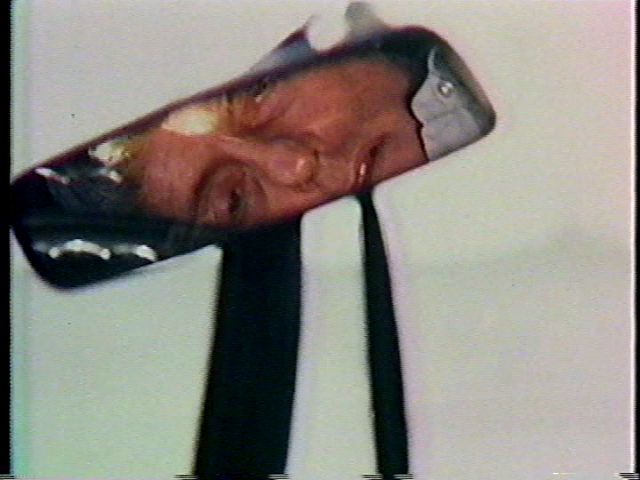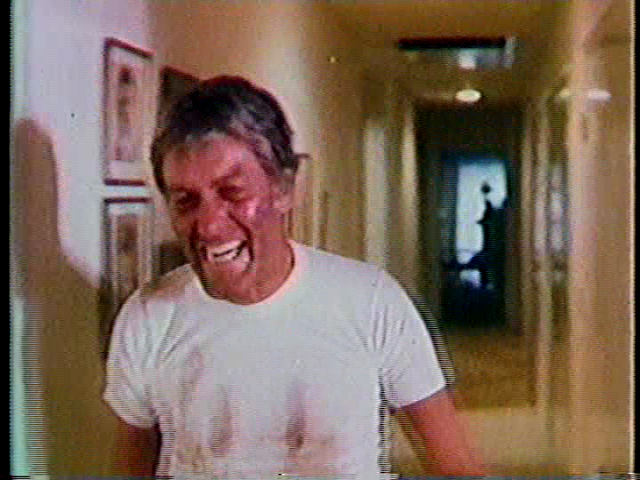In one of the tidier alcoves of an idyllic, all-but-lost suburban landscape, circa 1973, the Lester family prepares to ring in another joyous holiday season, decorating the Christmas tree and toasting the evening with wine, dad resplendent with jubilation for the ceremony.
Charlie Lester is celebrating, and why not? It's Christmastime, and the rising PR man just finished watching his boss give a speech he wrote—a speech that went over exceptionally well (and garnered him a substantial new raise in salary). So maybe the tinge of doubt and remorse when he bought that bagful of wine on the way home were just old ghosts trying to spoil the fun. It had been awhile since he'd allowed himself a few drinks; awhile since he'd gotten it all under control again.
"Wine?!"
"Not to fear, old girl, we're just gonna have a little celebration is all. And we have got something to celebrate..."
And then several hours later, when she finds him still drinking by the Christmas tree...
"Can't sleep?"
"Fran, it's only wine. 24 proof, that's only 12% alcohol by volume. The French drink it with their meals. Their kids drink it instead of milk."
"Charlie, have you already forgotten the last time..."
And that's how it begins. A family man with a history of alcohol troubles enjoys some professional success and allows himself a little slip-up over the holiday season, a slip-up that gradually gains traction.
"Charlie, alcohol is alcohol and you just can't handle it!"
"Okay, you're right. Alcohol is alcohol. But I'm not an alcoholic, Fran. I'm not."
THE MORNING AFTER was an ABC TV movie based on the best-selling novel by Jack B. Weiner and adapted for television by acclaimed fantasy writer, Richard Matheson (THE INCREDIBLE SHRINKING MAN, I AM LEGEND). Though TV movies were produced en masse in the seventies, this one has become the stuff of legend and is still remembered today for its harrowing, unflinching take on alcoholism—one which caught so many viewers off guard when it originally aired.
The next day we find Charlie back at the office, calling Fran to tell her he'll be missing dinner because of the company Christmas party. When she admonishes him for neglecting to mention he'd be out so late, he all but promises he'll be home by ten and won't be drinking.
But after ordering a ginger ale for himself, one of the office carousers tests Charlie's resolve.
"Oh, whoa, no...you're a bad influence. Just a little smidge."
Cut to Charlie sitting in on drums with the band, letting it all hang out in his newly designated role as life of the party; and then, later, on the couch with his fellow revelers... As the band clears out and but a few late-night holdouts remain, it's clear Charlie will be in hot water whenever he does decide to go home.
And the next morning...
"Well, I guess you don't look too bad for a 43 year old drunk...Charlie, couldn't you have telephoned me? Couldn't you have made one lousy call and said, 'It's okay, Fran, I'm still alive, you can go to sleep now'?"
"I'm sorry."
But when she takes the kids to the dentist awhile later and Charlie's left to his own devices, he figures what his awful hangover could really use is a stiff drink or two.
"More? You've had more!"
 |
| Lynn Carlin, superb in the role of Fran Lester |
(slurring, clearly smashed) "Hey, take it easy, I just had a couple."
"A couple?! How many is a couple, Charlie—5, 10? You're drunk all over again!"
And this scene, which spills out in front of his children, is one of the first indications that Charlie's in deep this time.
In accordance with the de facto laws of the family man, Charlie makes amends the next morning, cooking a pancake breakfast for the gang and putting up his son's basketball net. Later, over an ebullient board game session, it's clear that he doesn't need to work too hard for their love. It's an endearing scene providing a glimmer of hope that all might be right in the world again, if only dad and God's willing.
Unfortunately, Charlie’s condition steadily worsens, threatening to derail both his career and marriage. After showing up to an important meeting stinking of booze, his boss gives him an ultimatum to clean up his act or else, a stunning turnabout from his earlier success.
 |
| "I can't tell you how awful I feel to have to talk to you this way..." |
 |
At home, the situation becomes increasingly dire as, from one episode to the next,
things devolve into hopelessness and violence. A tipsy dinner party with friends ends in bitter embarrassment, and worse yet—the first instance of physical abuse—after Charlie manhandles his wife, shoving her to the floor (while wrestling for the car keys) in front of his screaming children. The next day,
after sobbing uncontrollably, he promises to seek psychological help—a short-lived
endeavor he ultimately spurns.
 |
| As doomed family man, Charlie Lester, Dick Van Dyke gives the gut-wrenching performance of a lifetime. |
Later, Fran finds him deep in drink and chatting with a young woman in a local bar, a scene which spins out of control when she once again tries to wrestle the car keys away.

When it spills out into the dark parking lot, Charlie finds himself at a new low, decking his long-suffering wife with a brutal surprise left hook. As she lay motionless on the cool evening pavement, beaten of her wits, Charlie hits the gas and peels out in pursuit of his next drink.

And after a particularly bad day at work, just as it seems his career is verging on disaster, his wife and children surprise him with packed bags and looks of total despair (Fran now sporting a black eye as well). It's too far gone now, Charlie.
If he gets his act together, maybe they'll come back...
And it seems every time he hits rock bottom, every time you ask yourself how it could possibly get any worse, it does indeed get worse.

When it spills out into the dark parking lot, Charlie finds himself at a new low, decking his long-suffering wife with a brutal surprise left hook. As she lay motionless on the cool evening pavement, beaten of her wits, Charlie hits the gas and peels out in pursuit of his next drink.

And after a particularly bad day at work, just as it seems his career is verging on disaster, his wife and children surprise him with packed bags and looks of total despair (Fran now sporting a black eye as well). It's too far gone now, Charlie.
If he gets his act together, maybe they'll come back...
And it seems every time he hits rock bottom, every time you ask yourself how it could possibly get any worse, it does indeed get worse.
Much of the sheer force and effectiveness of THE MORNING AFTER is directly attributable to the performances of its leads, Dick Van Dyke and Lynn Carlin. Van Dyke, who to this point had been known primarily for his comedic roles, had himself recently battled alcoholism, and as Charlie Lester really went out on a limb (earning an Emmy nomination), committing fully to a role that required everything and more. Known for her emotional range, Lynn Carlin (FACES) gave a likewise stirring, agonizing portrayal of a woman desperately trying to hold her family together.
Over the years, THE MORNING AFTER has become an enduring and revered part of TV movie mythology, often remembered but seldom actually seen. Though shown in treatment programs for decades, it wasn't often rerun on television, and to this day is only available in the form of a rather choppy bootleg.
It was rare for network television in that it tackled alcoholism head-on and offered no happy ending to viewers hoping Dick Van Dyke would eventually overcome his affliction. On the contrary, Richard Matheson’s vivid, uncompromising script follows a family man's irretrievable descent into the abyss. The catharsis many hoped for never arrives as we witness his (and his family's) absolute devastation to alcohol.
It was rare for network television in that it tackled alcoholism head-on and offered no happy ending to viewers hoping Dick Van Dyke would eventually overcome his affliction. On the contrary, Richard Matheson’s vivid, uncompromising script follows a family man's irretrievable descent into the abyss. The catharsis many hoped for never arrives as we witness his (and his family's) absolute devastation to alcohol.
And so we next find Charlie grinning wildly, seemingly lost as he wanders his home crying out for his estranged wife. Stumbling through the vacant, sullied halls
that somehow feel haunted by the family that abandoned them, he
seems little more than a ghost himself, a foul, stricken apparition stirring up
old torments and creating new disturbances that no one will ever witness or
wonder about.
And yet his grim slide into oblivion isn't quite over.
No, Charlie Lester cannot stop drinking.
“We are each our own devil, and we make this world our hell.”~Oscar Wilde































